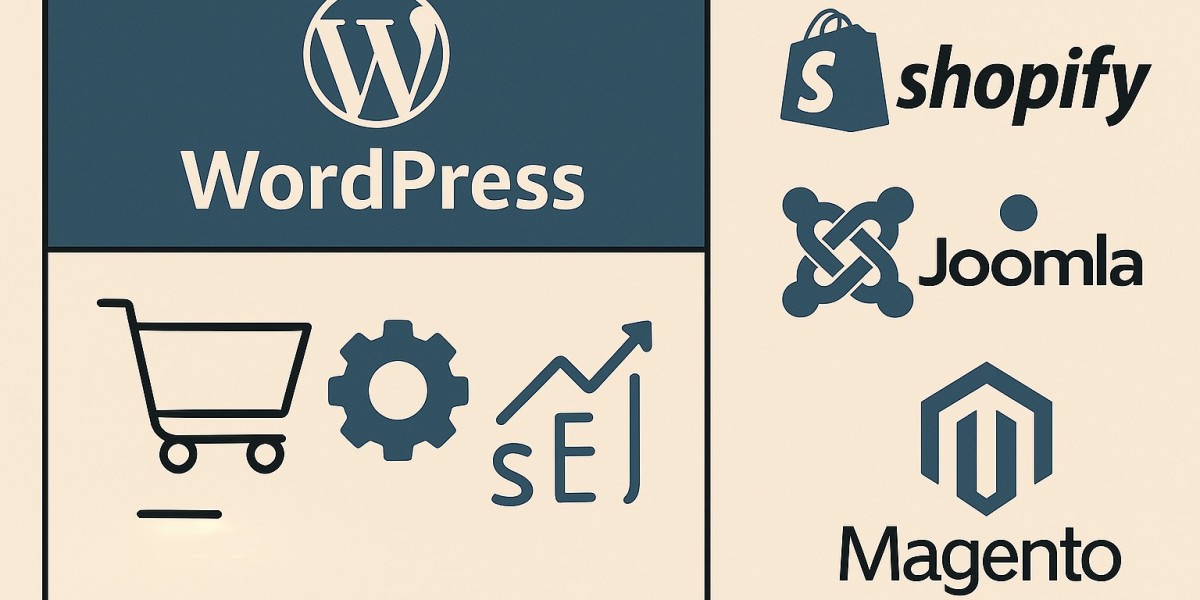A Content Management System (CMS) helps users create and manage websites without coding knowledge. It is especially useful in e-commerce, where businesses need flexible, easy-to-use tools. Many CMS platforms are available, like WordPress, Shopify, Joomla, Drupal, and Magento.
Why WordPress Is Better Than Other CMS for e-commerce is a question many new website owners ask. In this blog, we will compare WordPress with other CMS platforms based on features, usability, design, SEO, and cost.
What Makes WordPress Popular
WordPress is one of the most used CMS platforms in the world. It powers millions of websites, including e-commerce stores. Here are some key reasons for its popularity:
Open-source and free to use
Easy to install and manage
Thousands of themes and plugins
Supports SEO-friendly structure
Works well for all business sizes
WordPress uses plugins like WooCommerce to turn a basic site into a fully working e-commerce store. This flexibility is one of the main advantages over other CMS platforms.
WordPress vs Shopify
Shopify is built mainly for e-commerce. It offers an easy setup for online stores but has some limits.
Design and Customization
WordPress allows full design control through themes and page builders.
Shopify gives templates but has less freedom in design changes.
SEO and Content Tools
WordPress has better tools for content writing, SEO optimization, and blogging.
Shopify has fewer content features, which may affect visibility in search engines.
Cost and Control
WordPress hosting can be cheap, and many plugins are free.
Shopify charges monthly and has extra costs for apps and themes.
WordPress wins in flexibility and SEO features. It gives full control to users.
WordPress vs Joomla
Joomla is another CMS platform, but it is more complex.
Ease of Use
WordPress has a user-friendly dashboard and many tutorials.
Joomla needs more technical skill and may confuse beginners.
Plugin and Theme Support
WordPress has over 50,000 plugins.
Joomla has fewer choices, and support can be harder to find.
SEO and Community
WordPress has stronger SEO tools and a larger support community.
Joomla’s SEO tools are basic and need manual work.
In comparison, WordPress is easier for both beginners and experienced users. It also handles SEO better.
WordPress vs Magento
Magento is a strong CMS built for large e-commerce sites.
Complexity and Setup
Magento setup requires a developer or technical team.
WordPress with WooCommerce is easier and quicker to set up.
Hosting and Speed
Magento needs special hosting due to its size.
WordPress works well with basic hosting and has many speed plugins.
SEO and Marketing
WordPress includes more SEO and content marketing tools.
Magento has features but needs more effort to use them fully.
Unless you run a very large online store, WordPress is a better fit for most users.
WordPress for Small and Medium Stores
For small business owners, starting an online store with WordPress is simple. They can:
Choose a ready-made theme
Install WooCommerce
Add products with ease
Use SEO plugins to grow their audience
This easy setup helps many business owners go online without large investments.
WordPress and SEO Benefits
Search engines like websites that are well-structured, fast, and filled with useful content. WordPress supports this in many ways:
SEO-friendly URLs
Mobile-friendly themes
Speed optimization plugins
Easy content updates
SEO Glossary support through plugins
Using tools like Yoast SEO or Rank Math, users can easily improve their site’s search ranking.
Community and Support
WordPress has a global community. This means:
Free help from forums and blogs
Thousands of tutorials and videos
Regular updates to improve security and features
Other CMS platforms may not have such strong community support. This makes WordPress safer and more helpful for new users.
Flexibility for Any Business Type
WordPress is not just for blogs or stores. It can be used for:
Company websites
Portfolio sites
Online learning (LMS)
Forums and membership sites
With just a few plugins, the same WordPress site can serve many roles. This is harder to do in most other CMS platforms.
Security and Maintenance
Security is important for e-commerce. WordPress makes it easier to:
Add security plugins
Keep themes and plugins updated
Back up sites regularly
While all CMS platforms need care, WordPress offers easier tools to manage these tasks.
Final Thoughts
Choosing a CMS depends on your needs. But for most e-commerce websites, WordPress offers the best mix of:
Easy use
Powerful plugins
SEO tools
Low cost
Active community
These features make it a strong option for both small and growing businesses.
As we’ve seen in this blog, Why WordPress Is Better Than Other CMS becomes clear when you look at all the benefits WordPress brings to e-commerce.








